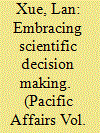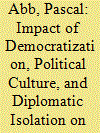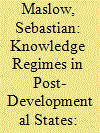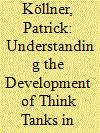|
|
|
Sort Order |
|
|
|
Items / Page
|
|
|
|
|
|
|
| Srl | Item |
| 1 |
ID:
158497


|
|
|
|
|
| Summary/Abstract |
The literature has traditionally regarded the rise and fall of Chinese think tanks as a product of the relaxation or tightening of control over the ideological domain by the Communist Party of China (CPC). However, since 2013, think tanks in China have continued to prosper in spite of the general perception that the ideological domain became more restricted. This article explains the reasons for, and consequences of, the rise of key think-tank policies and the construction of “New-Type Think Tanks with Chinese Characteristics” (NTTTCC). We argue that the success of Chinese think tanks has been driven primarily by greater official recognition of their value, due to increasingly complex domestic and international problems stemming from a fragmented decision-making system. We further argue that the rise of think-tank policies in China can be attributed to a long history of interactions among multiple internal and external actors, which in turn, opened the “window of opportunity” for a new policy agenda. Consequently, by late 2015, the new policies led to the selection of twenty-five “pilot high-end think tanks” and the establishment of the management system of think tanks in China.
|
|
|
|
|
|
|
|
|
|
|
|
|
|
|
|
| 2 |
ID:
158498


|
|
|
|
|
| Summary/Abstract |
Taiwan’s landscape of think tanks, despite having emerged during a time of Leninist one-party governance and state-led economic development not unlike that in Mainland China, is today marked by a substantial agency in conducting both research and advocacy. This sets them apart from their counterparts on the mainland. We ask how this development was shaped by Taiwan’s evolution as a political entity, especially its experience of gradual political liberalization and eventual full democratization by the mid-1990s. In its wake, multiparty competition, factionalism, the emergence of a vigorous civil society, and individual interest groups created an environment in which think-tank services were sought by many competing actors, offering a wide array of funding opportunities for policy research. Additionally, a political culture that stresses expertise and the need to conduct unofficial diplomacy often gave think tanks a privileged position within the system, and they served as key agents in conducting the kind of informal diplomacy made necessary by Taiwan’s loss of diplomatic recognition from the 1970s onwards.
We further offer an overview of Taiwan’s think-tank landscape, describing major groups (or types) of institutes and briefly portraying especially prominent cases within them. Finally, we provide two detailed case studies to show how these institutes operate in practice, and how the need for unofficial diplomacy and a recent government change have shaped their activities.
|
|
|
|
|
|
|
|
|
|
|
|
|
|
|
|
| 3 |
ID:
158499


|
|
|
|
|
| Summary/Abstract |
Tracing the mechanisms of policy change, recent studies of knowledge regimes in Western democracies have examined the reciprocal relationship between a state’s institutional features and the role of think tanks in the production and dissemination of policy ideas. This paper expands the focus to East Asia and examines the role of think tanks in Japan. With a strong bureaucracy functioning as the primary repository for policy expertise, Japan’s developmental state has long been discouraging the creation of independent think tanks. Yet, Japan’s bureaucratic and electoral reforms in the 1990s have opened new access points to the policy process, encouraging the growth of new think tanks in addition to Japan’s semi-governmental and corporate research organizations. By looking at the Abe government’s national security discourse and Japan’s debate on participation in the Trans-Pacific Partnership Agreement during the period 2012 to 2015, this article assesses the role of external policy advice in Japan’s post-developmental state. The study illustrates the link between Japan’s changing political system, the changing nature of its knowledge regime, and the structural conditions under which think tanks yield influence in Japan. By doing so, this article offers evidence of an increasingly competitive think-tank landscape structured along the conservative and progressive political spectrum of policy ideas, and unpacks the strategies by which think tanks penetrate Japan’s policymaking process. However, despite the enhanced role of think tanks, the findings also point to the sustained prominence of individual intellectuals and academics in advising Japan’s decision makers.
|
|
|
|
|
|
|
|
|
|
|
|
|
|
|
|
| 4 |
ID:
158496


|
|
|
|
|
| Summary/Abstract |
China’s government is promoting new-type think tanks. These are often treated with scepticism by Western observers, due to their lack of independence from government and operation within a controlled intellectual environment. In this article, I heed recent calls by scholars to analyze think tanks, and how they develop, in their particular national political contexts. In China’s case, this is a powerful one-party state undergoing internationalization: usually understood as increased foreign exchanges, engagement with international institutions, and rising influence globally. In contrast, I view internationalization as the reorganizing of China’s state institutions and social structure in order to integrate with the global capitalist system. Through these processes, China’s policymaking community is converging with a powerful transnational class aligned with global capitalist interests. Think tanks are implicated in these processes, and are therefore involved in shaping capitalist class dynamics within China. This is a cause for concern and debate among policy makers, regarding “civil” think tanks in particular, which are non-governmental and privately funded. Drawing on interviews with Chinese think-tank scholars, and examining policy debates on the development of think tanks in Chinese academic and policy journals, I argue that the sphere of think tanks has become an important site of political contestation concerning China’s internationalization and the impact of class power on national policy making. Western observers, too often viewing independence as the key criterion for evaluating China’s think tanks, miss the significance of these debates. The relations between think tanks and government institutions must be understood in this political context.
|
|
|
|
|
|
|
|
|
|
|
|
|
|
|
|
| 5 |
ID:
158495


|
|
|
|
|
| Summary/Abstract |
Many new think tanks have emerged in East Asia in recent decades. The region is home to highly diverse and in some cases very vibrant environments for think-tank development. While there are some commonalities among think tanks in East Asia in terms of the models used at the time of their establishment, there is no uniform pattern of think-tank development in the region that can be traced back to the operations of developmental states. This Special Issue explores the driving forces of and the challenges to think-thank development in three specific East Asian settings: Mainland China, Taiwan, and Japan. In particular, the experience with think-tank development in Mainland China raises the necessity of reconsidering prevailing conceptions that think tanks can only prosper in democracies and when they are independent of the government.
Two broad conclusions emerge from this Special Issue. First, the contributions emphasize that context matters for think-tank development and, more specifically, that national think-tank sectors are greatly influenced by the particular political context in which they exist. Second, the contributions show not only that the specific political context factors that impact the trajectories and traits of East Asian think-tank sectors vary between countries, but also that they operate at different interactive levels: (a) at the level of the inter- and transnational context within which think-tank sectors develop; (b) at the level of domestic governmental systems and their openness to external policy advice and other think-tank services; and (c) at the level of individual political leaders interested in engaging with think tanks.
|
|
|
|
|
|
|
|
|
|
|
|
|
|
|
|
|
|
|
|
|